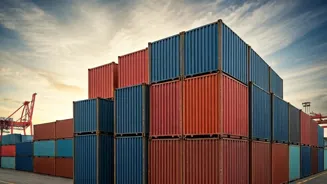Protectionism's Shadow
The increasing prevalence of protectionist measures, particularly in the global economic landscape, presents a significant challenge for emerging markets.
The imposition of tariffs, such as the 50% tariff initiated by the US, directly impacts trade flows and can lead to retaliatory actions, creating uncertainty for businesses and investors. These types of actions may disrupt established supply chains, which can drive up costs for consumers and businesses. The presence of trade barriers also can hinder economic growth, because it makes it harder for countries to specialize in producing goods and services where they have a competitive advantage, which ultimately lowers overall economic efficiency. Emerging economies must adeptly navigate these headwinds, devising strategies to mitigate the adverse effects and foster resilience in the face of protectionist policies.
Trade Talks in Focus
Trade negotiations play a critical role in shaping international economic relations, and the presence of US negotiators in Delhi highlights the significance of these discussions. Negotiations often aim to resolve trade disputes, reduce tariffs, and create more open and fair market access. These talks can be complex, involving multiple issues and requiring compromise from all parties. The outcomes of such talks can have a substantial effect on individual sectors, businesses, and the broader economy. For emerging markets, successful negotiations can open up new opportunities for trade and investment, while unsuccessful ones can lead to economic setbacks. India's stance and the outcomes of the talks could significantly influence the country's economic trajectory and its place in the global trading order.
Infrastructure & Criticism
Public opinions and social issues can influence perspectives on national matters, such as infrastructure. While some individuals may hold positive views on urban development, such as the claim that Mumbai's infrastructure is superior to Singapore's, such statements often invite scrutiny and debate. Infrastructure projects are often debated by the public and are subject to scrutiny, and the public response can vary widely depending on several factors. These might include factors such as the level of investment, the quality of execution, and the extent to which the project aligns with public priorities. The responses frequently reveal the varying experiences and values among citizens. The impact of infrastructure and urban planning in India is thus a reflection of broader social dynamics. These dynamics reflect the constant interplay of aspirations, resource constraints, and efforts toward inclusive growth and development.
Sports Diplomacy & Tension
Sporting events can sometimes become a stage for expressing political tensions. A dispute concerning match-related protocols, involving allegations of non-cooperation or unsportsmanlike conduct, can intensify pre-existing strains between nations. The Pakistani complaint to the ICC regarding the alleged refusal of a handshake by team captains is a good example of how incidents within the context of sports can capture broader political dynamics. These instances are often viewed as symbolic representations of larger geopolitical disputes and can shape public perceptions and diplomatic relationships. The response from each nation to such incidents shows a complex interplay of national interests, diplomatic relations, and public sentiments. The outcomes of these disputes frequently reflect the broader context of bilateral relations, showcasing the influence of sports in national and international affairs.
Social commentary and film
The intersection of entertainment and social commentary provides insight into a society's cultural values and the personalities of entertainers. An actor's statement on his acting style, as well as a perceived demand for increased compensation, offers a snapshot of the industry's dynamics and public perception. This also points to the business aspects that often characterize filmmaking and artistic expressions. The public's interest is drawn to the interplay of relationships and to the roles of prominent people. This also provides a sense of the creative process and the challenges involved. These instances reflect a dynamic fusion of art, business, and public interest, while showing a complex interaction of public interest, social observations, and individual pursuits.
Community Action & Status
Social and political movements, such as the 'economic blockade' initiated by the Morans in Assam, demonstrate the diverse ways communities strive to achieve their objectives. Such actions often highlight specific concerns. These might include demands for recognition, economic empowerment, or social justice. These types of actions often create disruption and have a noticeable effect on the people who are involved, which impacts local government and business operations. The Morans' demand for Scheduled Tribe (ST) status reflects the broader dynamics of identity politics and the need for inclusion. These kinds of actions highlight the complex social landscape, the importance of community participation, and the constant search for equity and self-determination.















